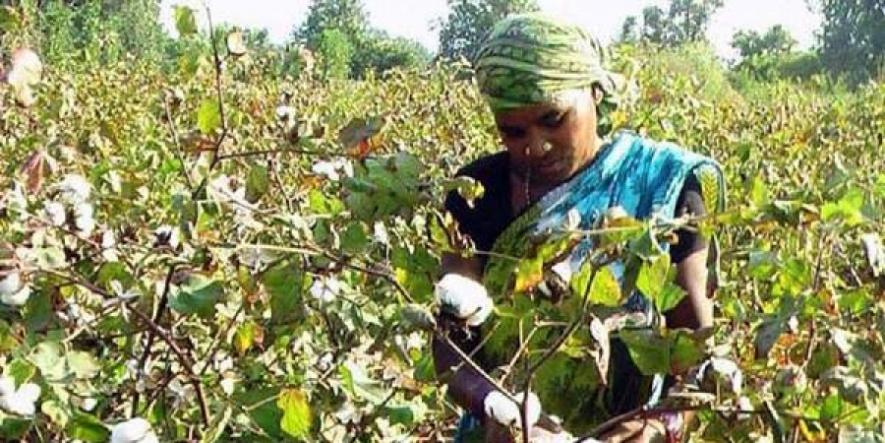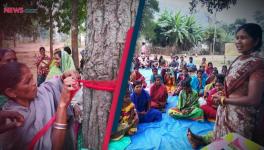Odisha: How Illegal Bt Cotton is Making Inroads into Tribal Pockets of Niyamgiri

Image Courtesy: The New Indian Express
New Delhi: In Odisha, vulnerable tribal farmers, those recognised as the Dongria Kondhs, are resorting to cultivation of genetically modified (GM) Bt Cotton as its seeds are now easily available at the local market. As a result, a ‘cotton crisis’ is brewing in Rayagada district of South-Western region of Odisha, as Bt Cotton seeds are making inroads into farming patterns with many unaware of its side effects.
The seeds are genetically modified and herbicide tolerant. Both BT cotton and HT cotton are illegal in Odisha, as they are deemed toxic since their usage involves a lot of chemicals. Interestingly, cotton itself is not part of the local ecology, but the area is witnessing a surge in cotton production.
Cotton crisis: Small farmers worst hit
Farmers in the area who are tied to debt are reportedly getting loans from moneylenders for sowing cotton. Digital journalism outfit People’s Archive of Rural India (PARI) reports that the area under cotton production in Rayagada has risen significantly – by over 5,200% in close to 16 years. Official data shows that just 1,631 acres was under cotton in 2002-03. In 2018-19, the number reportedly stood at 86,907 acres, according to the district agriculture office.
The PARI data also highlights the surge that has now made cotton the second-most cultivated crop in Rayagada after paddy, overtaking millets – the premier traditional food crop of the region. Cotton now covers a fifth of the 4,28,947 acres under cultivation in this district.
Speaking to NewsClick, local journalist Rabi Shankar said that “cotton cultivation takes place in the area spanning over 27,000 hectares, especially in the areas of Rayagada and Bhoolpur.” He said Cotton Corporation of India (CCI) was purchasing “one quintal of cotton for Rs. 5,400. As production surged, the mandis in Rayagada established a process to allow for only a few trucks in the mandis, resulting in storage becoming a problem. The need for money and storage woes have now forced smaller farmers to sell their produce to the bigger players to make a quick buck,” he added.
The sale of cotton in the area begins from December, at a time when the Regulated Market Committee (RMC) purchases cotton. Since February 25, farmers have been waiting to sell their produce but could not do so because of storage issues. At the same time, they are buying Bt Cotton seeds owing to higher yields. However, they are suffering when it comes to getting a price for their labour. The difference between their selling price to CCI and to middlemen and bigger farmers, is substantial, and varies between Rs 700 and Rs 1,000 per quintal.
Shankar said profits from the procurement go into the pockets of middlemen, CCI and the RMC, inconveniencing smaller farmers. “On the 5th of this month, Dongria Kondh Tribal farmers A. Jakkaka and Sadaram Kadarka from Rayagada and affiliated blocks arrived at the Rayagada Mandi to sell their produce and left feeling disappointed with the entire process. It is in this context that the harmful BT Cotton is making inroads here,” he added.
Speaking to NewsClick, Kavitha Kuruganti of Kisan Swaraj (Alliance for Sustainable & Holistic Agriculture (ASHA)), said that “regulatory failures and an extension system that is not gearing its approaches and messages to the unique conditions of this region can prove to be disastrous to the health, environment and livelihoods of communities here.” She added that there was a need for penalties on “illegal seed suppliers”.
Researchers from PARI, who visited the area to report on the phenomenon, warned: “The scenario here is reminiscent of Vidarbha between 1998 and 2002 – initial excitement over the new miracle (and then illegal) seeds and dreams of great profits, followed by the effects of their water-guzzling nature, the huge spike in expenses and debt, and various ecological pressures. Vidarbha subsequently ended up as the epicentre of farmer suicides in the country for over a decade. Those farmers were overwhelmingly Bt cotton growers.”
Get the latest reports & analysis with people's perspective on Protests, movements & deep analytical videos, discussions of the current affairs in your Telegram app. Subscribe to NewsClick's Telegram channel & get Real-Time updates on stories, as they get published on our website.





















